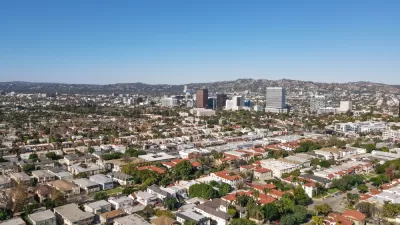California housing regulators have granted preliminary approval for the city of San Francisco’s housing element as mandated by the state’s Regional Housing Needs Allocation process.

State regulators at the California Department of Housing and Community Development have granted preliminary approval to the housing element of the city’s General Plan, reports J.K. Dineen in a paywalled article for the San Francisco Chronicle. San Francisco’s proposed housing element would allow planned capacity for 82,000 new housing units.
The city of San Francisco has become a symbol of the housing affordability crisis facing cities around the state and country, with some of the highest housing prices and a reputation for one of the strongest coalition of anti-development politics, otherwise known as NIMBYs, in the country. Other cities around the state have struggled to meet the mandates of the state’s every-eight-years Regional Housing Needs Assessment (RHNA) process. HCD in February 2022 rejected the housing element proposed by Los Angeles before approving an updated version in June. A tally in October counted two-thirds of Southern California cities failing to meet their RHNA deadlines last year.
Cities failing to meet RHNA standards exacted by HCD regulators face a loss of local control known as the “Builder’s Remedy.”
The San Francisco Board of Supervisors is scheduled to vote on the city’s new housing element on Tuesday.
As noted by Dineen, the approval of the housing element is “just the start of what will likely be an intense and politically controversial three-year process of rezoning entire neighborhoods in order to allow multi-family buildings.”
Specifically, the plan commits to an October 2026 deadline for a rezoning program that would allow at least 36,282 units. New regulations will need to be passed that will permit multifamily buildings — at least 20 units per acre — without the “discretionary review” process that is used to stall and kill many housing developments in San Francisco.
As noted by Dineen, the housing element’s call for 82,000 units is exceedingly ambitious compared to the city’s track record. The city has only averaged 2,550 units a year over the last two decades. Half of the planned units must be affordable to low- and moderate-income households, adding to the challenge for the city faces in achieving its housing goals.
FULL STORY: S.F.’s plan to build 82,000 housing units has been approved by the state

Alabama: Trump Terminates Settlements for Black Communities Harmed By Raw Sewage
Trump deemed the landmark civil rights agreement “illegal DEI and environmental justice policy.”

Planetizen Federal Action Tracker
A weekly monitor of how Trump’s orders and actions are impacting planners and planning in America.

Why Should We Subsidize Public Transportation?
Many public transit agencies face financial stress due to rising costs, declining fare revenue, and declining subsidies. Transit advocates must provide a strong business case for increasing public transit funding.

Understanding Road Diets
An explainer from Momentum highlights the advantages of reducing vehicle lanes in favor of more bike, transit, and pedestrian infrastructure.

New California Law Regulates Warehouse Pollution
A new law tightens building and emissions regulations for large distribution warehouses to mitigate air pollution and traffic in surrounding communities.

Phoenix Announces Opening Date for Light Rail Extension
The South Central extension will connect South Phoenix to downtown and other major hubs starting on June 7.
Urban Design for Planners 1: Software Tools
This six-course series explores essential urban design concepts using open source software and equips planners with the tools they need to participate fully in the urban design process.
Planning for Universal Design
Learn the tools for implementing Universal Design in planning regulations.
Caltrans
Smith Gee Studio
Institute for Housing and Urban Development Studies (IHS)
City of Grandview
Harvard GSD Executive Education
Toledo-Lucas County Plan Commissions
Salt Lake City
NYU Wagner Graduate School of Public Service





























